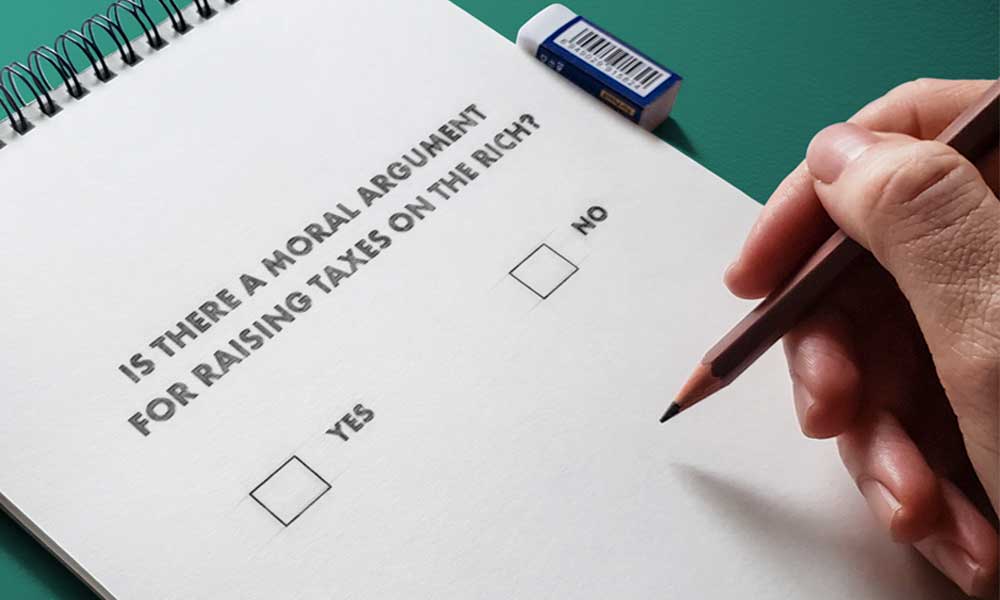INTERVIEW WITH HARVEY S. ROSEN
Is there a moral argument for raising taxes on the rich? | No
Is there a moral argument for raising taxes on the rich?
No. I don’t see any reason to tax the rich per se, and it’s not clear to me that it’s a moral thing to do. I see no particular virtue in ganging up on a group of people just because they have money.
Anyway, the question distracts us from the basic issue: “What’s the goal of taxation, and what kind of taxes will help achieve it?” The goal should be to enhance growth, but also to distribute the burden of taxes fairly. A tax system will boost growth if it distorts people’s decisions about work, investment, savings and risk-taking as little as possible. Fairness is in the eye of the beholder. While critically important, it’s a value judgment. The focus should be on the best trade-off between growth and fairness, not on hammering the rich.
Regardless of your politics, you should care about growth. Think of the Bernie Sanders agenda: free daycare, free college, paid leave, etc. You need money for those programs, and you get it from a high-growth economy, one in which people make economic decisions on the basis of fundamentals, not to dodge taxes. To avoid taxes, a corporation can always invest less, hire fewer people or just locate somewhere else. And even if you have your heart set on screwing corporations, you should do it efficiently by broadening the tax base—for instance, by telling corporations they can’t deduct interest anymore—rather than by raising the tax rate. That would arguably make the system fairer, and you’d get more money.
Can taxes be so high that they are inherently morally wrong?
I wouldn’t put it that way. But at some point, if rates get too high, revenue goes down. That’s the infamous Laffer curve. If you’re raising taxes on some person or activity so much that it actually reduces tax receipts, it means you hate that person or activity so much you’re willing to sacrifice all the progressive goodies you could fund with more money—more education, more abortion clinics, whatever—just to hurt them.
I see no particular virtue in ganging up on a group of people just because they have money.
During the Obama campaign, a reporter asked the candidate what he would say to people who argue that raising the capital gains tax will actually reduce revenue. I was sure Obama would challenge the premise, but instead he said, essentially, “I think we have to spread the wealth around.” In other words, he embraced the notion of punishing the wealthy even if it would mean less revenue for the Treasury. Is that a moral way to conduct taxation? Even rich people are still members of the community. Is it good to tax their income at such a high rate that you have less money to spend on beneficial programs? It doesn’t sound moral to me.
Will it help to increase compliance through more aggressive tax collection?
I’ll raise my hand and call bullshit on that. When I was working in the Treasury Department, I learned about the “tax gap”: the difference between the amount of money you collect in taxes and the amount you would collect if compliance were perfect. Every administration, Democratic or Republican, says, in effect, “Give us $50 billion more for the IRS, and the money will come rolling in!” I was in charge of the Treasury’s Office of Tax Analysis, and my staff researched this and found that a good chunk of that money is simply not collectable. It’s owed by people who have gone bankrupt, or disappeared, or who just don’t have the cash. You just can’t get it. I had to tell the Secretary that increasing IRS funding wouldn’t bring in buckets of money. It was very deflating. Years have passed since then, and I haven’t studied the tax gap recently, but I’d be surprised if it’s much different.
Is there a Jewish view on taxes?
On page one of my introductory textbook on Public Finance, I have a long quotation from First Samuel. It’s the story about how the Israelite tribes wanted to have a king. They said to Samuel the prophet, “Give us a king! Everyone else has a king!” And Samuel said, no, that’s an awful idea, because if you have a king, he’ll want an army and palaces, and he’ll come to you for money, and it will be a burden on you. (Samuel eventually relented, and sadly, the consequences were exactly what he predicted!) This scenario perfectly encapsulates the subject matter of Public Finance. Governments spend money, but it has to come from burdensome taxes. Centuries have passed, mixed feelings about government remain, and much of the controversy still centers around its taxing behavior.



One thought on “Moment Debate | Is There a Moral Argument For Raising Taxes on the Rich?”
Artscroll publishes some wonderful biographies of the premier Rabbis of Eastern Europe, when Jews often lived in shetls or ghettos of cities but were autonomous. These bios often contain tales of the town’s Rabbi shaking down or in the case of butchers extorting larger donations from their wealthy citizens than the butcher or merchant offered to the Rabbi’s communal fund. Invariably, the Artscroll biographer takes a view that this is laudable conduct on the part of the Rabbi who will use those funds, voluntary or coerced, for public benefit. So at least in modern Judaism, exacting enhanced contributions from those able to provide it, even if not entirely voluntary, seems well accepted.